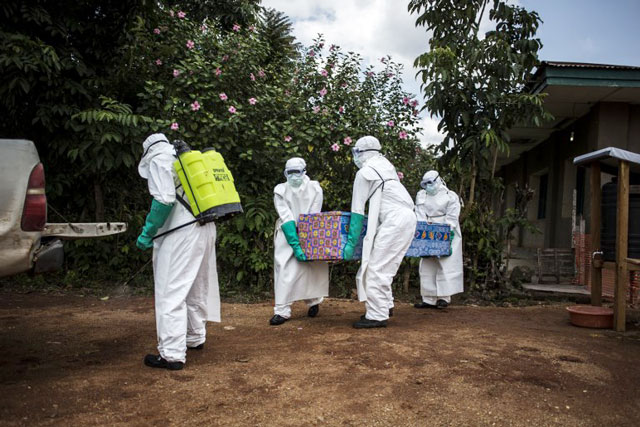
Uganda, surrounding countries face increasing risk as Trump blocks American experts
Kampala, Uganda | AGENCIES | One of the largest Ebola outbreaks in history shows no signs of slowing — and the Trump administration has barred U.S. health experts who want to help at the outbreak’s epicenter in the Democratic Republic of Congo from traveling there, according to Vox.
Centers for Disease Control and Prevention (CDC) officials were working in Beni; the city that’s ground zero for the outbreak in eastern DRC, for a few days in late August and early September. Experts say that is an unusually short period of time for infectious disease responses. The CDC deployments usually last at least four weeks, and many run for several months.
But then the White House’s National Security Council (NSC) coordinated a government review of the security risks, involving representatives from multiple government agencies and departments. The review determined that CDC officials could not return to areas where militant attacks threaten security, including Beni. News outlets first reported on Oct. 14 that the U.S. had pulled out of the area.
“It’s unprecedented that the CDC expertise is not at the very center of the response because that has been the pattern for the other outbreaks,” Stephen Morrison, a global health expert at the Center for Strategic and International Studies think tank in Washington, told Vox. “We have some people on CDC staff who are veterans of almost two dozen outbreaks.”
Others who have been on the ground working to curb this Ebola outbreak, which had led to 251 cases and 127 deaths by Oct.26 and growing, say they did not notice the CDC’s brief presence at all. A senior humanitarian official not affiliated with the Trump administration told Vox that he believed CDC experts were never in Beni.
Another non-administration senior humanitarian official added that while America has vehicles on the ground in the city, they have gone unused.
“Those three armored U.S. Embassy vehicles sitting in the UN parking lot in Beni for two months have never moved,” the official said.
However, CDC officials insist in conversations with Vox that its experts did work in Beni.
The relatively tepid response from the U.S., at a time when the outbreak is spiraling, has former CDC officials and global health experts concerned.
“I do worry that in the worst-case scenario, we could have an outbreak of tens of thousands of people,” said Daniel Bausch, the director of the UK Public Health Rapid Support Team, “and complete destabilisation of an already unstable region.”
This is an “unprecedented” response — in a bad way
*******
RELATED STORY
DETAILS: How Uganda plans to vaccinate health workers against Ebola PHOTO @WHOUganda https://t.co/RqyjFdfShV pic.twitter.com/Rnv5nkN9Me
— The Independent (@UGIndependent) November 2, 2018
*******
Tom Frieden, the former head of the CDC who responded to the Ebola outbreak in West Africa from 2014 to 2016, said that “it’s unusual” and “not optimal” for CDC experts not to work at the outbreak’s epicenter.
Others agree: The DRC health workers and others who are on the ground fighting the Ebola outbreak “are not winning the game,” Morrison said. “They need to have every player they can get on the field that is competent, experienced, and able to fix these problems.”
The outbreak started in July and has worsened in recent weeks, after a spate of violent attacks on civilians by Congolese rebels temporarily halted the public health response.
A CDC spokesperson said its staff has been in Kinshasa, 1,000 miles away from the outbreak zone, since early September, “where they continue to support the response.” But even before then, CDC’s involvement in eastern DRC was uncharacteristically limited. The CDC said its director, Robert Redfield, was in Beni for one day, while other staff were there for only “several days.”
Redfield has reportedly told a journalist that he wants CDC officials on the ground in the DRC’s eastern region to help with the outbreak response, but that he was overruled by security concerns.
“The (Ebola responders are) at an enormous disadvantage by not having the expertise the CDC has on the ground,” he said, adding that he’d be “happy” to travel there himself to help.
As of today, the CDC has only 18 staff deployed abroad to help with the Ebola response, and not all of them are even in the DRC (outside of the outbreak’s epicenter) — they are spread out in Uganda, Rwanda, South Sudan, and Switzerland as well.
The CDC wants to be in Beni. The administration says it’s too risky.
The argument to keep American health officials out of eastern DRC boils down to this: It’s a dangerous area, and no one wants to put U.S. officials in harm’s way.
 The Independent Uganda: You get the Truth we Pay the Price
The Independent Uganda: You get the Truth we Pay the Price


